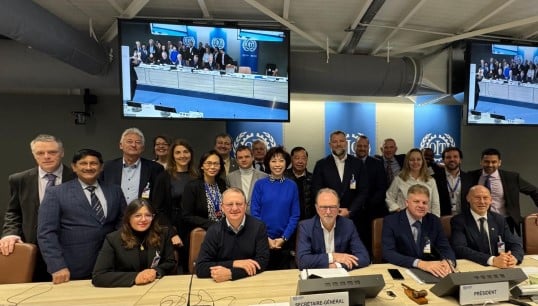
Seafarers ' unions, the International Labour Organization (ILO) and the International Maritime Organization (IMO) have adopted new guidelines for the prevention of unfair treatment and criminalisation of seafarers at a meeting held in Geneva last week.
Existing guidelines on fair treatment for seafarers came into force on 1 July, 2006. However, the International Transport Workers ' Federation believes that these have not been adequately enforced.
The meeting on new guidelines follows several high-profile cases in which seafarers have been mistreated following accusations around maritime accidents, pollution or smuggling – such as a case in Turkey where two seafarers were recently sentenced to 30 years in prison after drugs were found onboard their vessel, despite the lack of evidence against them.
The new guidelines adopted at the meeting will now be presented to the IMO Legal Committee and the ILO Governing Body in March 2025 for endorsement, after which they will be disseminated for implementation by IMO and ILO member states.
Nautilus general secretary Mark Dickinson led the delegation of seafarers ' unions at the meeting, in his capacity as elected spokesperson for the ILO Seafarers’ Group. He said: 'The ongoing failure to protect seafarers from criminalisation and unfair treatment comes at a time when the maritime industry is facing a global recruitment and retention crisis.
'These IMO and ILO guidelines are intended to ensure that seafarers detained on suspicion of committing a crime are treated fairly during any investigation or detention by public authorities, and to ensure that detention is for no longer than necessary.
'They acknowledge the unique role of seafarers, as key workers, and that, due to the global operations of the shipping industry and the many different jurisdictions that impact on seafarers, "special protection " must be afforded to them when it comes to contact with public authorities.'
The new guidelines also:
- set out the different responsibilities to treat seafarers fairly when detained on suspicion of committing crimes, for flag states, port and coastal states, shipowners and the state of which the seafarer is a national
- provide support towards seafarers, including access to consular services, their union, legal assistance, and specify the importance of non-custodial measures during an investigation
- emphasise the fundamental human rights of seafarers, and the need to treat seafarers with respect and dignity at all times
- call for the strengthening of co-operation between flag states, the states of nationality of seafarers, the port state where the seafarers are investigated or detained, and with shipowners and seafarers' unions
- agree that seafarers need to be made aware of the risks of incriminating themselves, and the options available should they end up in a situation where they are investigated or detained
Tags
